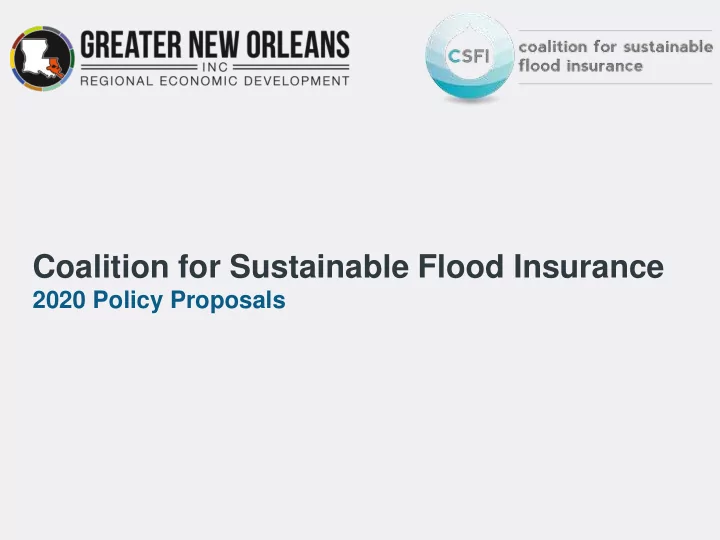

Coalition for Sustainable Flood Insurance 2020 Policy Proposals
The Coalition for Sustainable Flood Insurance The Coalition for Sustainable Flood Insurance (CSFI) was formed by GNO, Inc. in 2013, and grew to be national in scope. Since its inception, CSFI has worked with over 250 organizations and individuals in 35 states. 2
The Coalition for Sustainable Flood Insurance Led by GNO, Inc., and in partnership with the Delegation, the Coalition succeeded in passing the Homeowner Flood Insurance Affordability Act of 2014. Bicameral Action for LA 3
Why is Flood Insurance Important? All 50 states have experienced flood disasters. FEMA Flooding Related Disaster Declarations Since 1953 Key 60+ 50 - 59 40 – 49 30 - 39 20 - 29 0 -19 Note: Flooding related disaster declarations include; hurricanes, floods, severe storms, costal storms, dam/levee breaks, tsunami, and typhoons Source: FEMA Disaster Declarations for States and Counties as of 1/7/19 4
Volatile Weather is Increasing With weather comes risk and resulting damage. 5
The Economic Realities of Living Near Water Coastal = Commerce • Coastal areas have a population of 168,803,952 - 51% of the U.S. population • By 2023, the population of coastal areas will grow by 2.5% • Coastal areas have 82,740,493 jobs - 51% of the nation's jobs • Coastal areas have a GDP of $11 trillion - 57% of the total U.S. GDP. • With nearly 5.1M payrolled businesses, 51% of the nation’s total business are in coastal areas Emsi 2018.4; Coastal areas are in reference to the ones listed by NOAA, which includes counties on the great lakes 6
America's Flood Insurance Gap Solutions must focus on closing America’s insurance gap. 7
Key Principles CSFI believes the following key principles are critical to sustainable flood insurance: R isk Assessment – Enhancing the way we assess and communicate risk will protect communities and the NFIP over the long- term and help to close America’s flood insurance gap. Congress and FEMA should use state of the art technology to accurately and simply communicate flood risk A ffordability – Premiums must remain affordable, and people who played by the rules at the time they built or bought their flood policy should not be penalized. M itigation – A comprehensive approach to reducing flood losses before a disaster occurs is a more effective means to reducing economic loss and protecting taxpayers interests. Federal, state, and local governments should prioritize investments in mitigation, as should home and business owners P articipation – Adopting policies that encourage more people to carry flood insurance will ensure a greater understanding of flood risk and that individuals and communities recover more quickly and fully following a flood event 8
Progress on Key Priorities Real progress has been made in mitigation, recovery and even the definition of success. Disaster Recovery Reform Act of FEMA announced Moonshot 2018 signed into law making Goals of doubling coverage and numerous investments in quadrupling investments in mitigation and disaster recovery, mitigation by 2022: including: • Investing more heavily in pre- disaster mitigation funding • Allows resilience projects to be eligible for HMGP at a greater rate • Addresses duplication of benefits issue 9
R isk Assessment Proposals CSFI supports proposals to ensure risk is assessed & communicated accurately. 2020 Policy Proposals • Adopt recent innovations in elevation science to radically improve mapping and precision, including use of LIDAR data • Increase authorization for the National Flood Mapping Program to ensure adequate resources for flood mapping of the entire country • Codify exclusion provisions so that parishes and counties can adopt portions of maps at a time • Provide a one-time premium credit to all pre-FIRM properties that secure an elevation certificate • Fund reimbursements for successful map appeals Source: FEMA 10
A ffordability Proposals CSFI supports proposals that keep flood insurance affordable. 2020 Policy Proposals • Preserve grandfathering • Allow for monthly payments of premiums • Consider formalizing the 1% cost: value ratio, so that premiums would be capped at 1% of the value of the policy • Implement annual rate hike caps and affordability assistance • Address the NFIP’s debt 11
M itigation Proposals CSFI supports increased investment and ease of use for mitigation. 2020 Policy Proposals • Establish a State Flood Mitigation Revolving Loan Fund • Freeze interest payments on the NFIP's debt and redirect revenue to FEMA mitigation funds • Increase the maximum Increased Cost of Compliance coverage (ICC) payment from $30,000 to $100,000; ensure payment is not subject to policy caps and that eligibility and flexibility are expanded • Maintain requirements that any private flood coverage is equal to NFIP coverage, which preserves post disaster mitigation coverage similar to ICC on private flood policies 12
P articipation Proposals CSFI supports policies that increase participation. 2020 Policy Proposals • Offer a tax credit for flood insurance premiums • Allow for automatic renewals • Allow for multi-year policies • Include continuous coverage language to allow property owners to leave the NFIP for a private flood option and subsequently return if they choose • Expand coverage limits to for Source: FEMA residences, multifamily & business structures • Include business interruption coverage for business 13
Join Us Become a member of CSFI, and stay up to date! • Join CSFI by formally adding your organization to CSFI via our website: sustainablefloodinsurance.org • Sign up for email updates • Follow us on social media @csfiusa @CSFIUSA 14
Key Contacts Michael Hecht President and CEO mhecht@gnoinc.org Ileana Ledet VP of Policy iledet@gnoinc.org Hyma Moore VP of External Affairs (media contact) hmoore@gnoinc.org Caitlin Berni Berni Consulting caitlin@berniconsulting.com 15
Recommend
More recommend